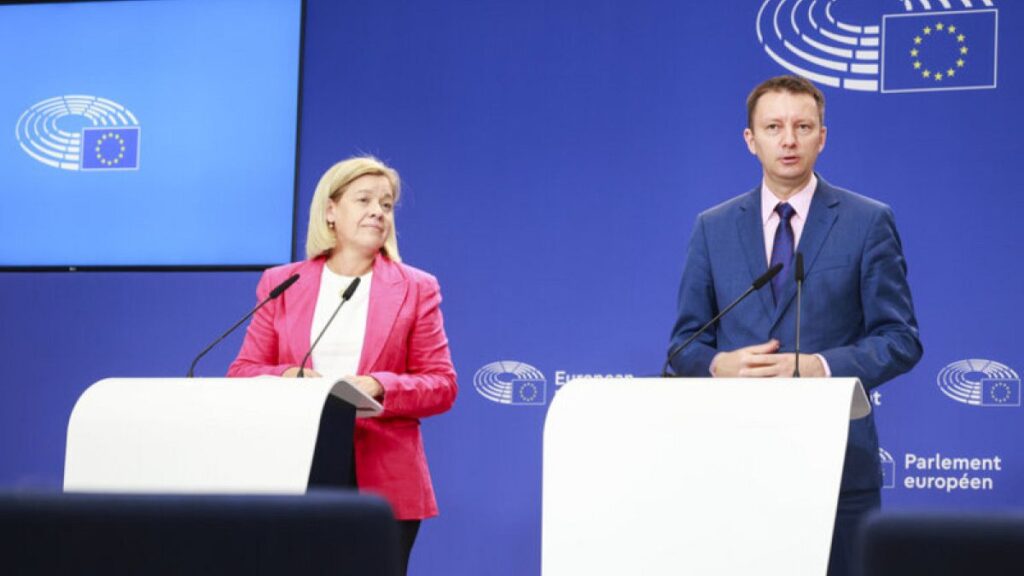The European Parliament’s members are deeply unsatisfied with the proposal for a seven-year budget, the Multiannual Financial Framework (MFF) put forward by the European Commission on Wednesday and have threatened at the outset not to enter into negotiations on the paper.
The level of information provided by Budget Commissioner Piotr Serafin in a briefing to MEPs from the Parliament’s Committee on Budgets (BUDG) on Wednesday was deemed unsatisfactory by most. “Commission President’s Ursula von der Leyen is giving a press conference and she is giving to the press more information than you to us,” lamented Belgian MEP Johan Van Overtveldt, the committee’s chair.
Some of his colleagues underlined the lack of figures, official documents, and explanatory materials from the Commission to prepare for the discussion with the Commissioner.
Commissioner Serafin, who acknowledged the discontent, said that he had left the decision-making meeting of the Commission early to be present at the Parliament and to present the proposal there first, “in recognition of [Parliament’s] role”.
MEPs were also very critical of the content of the proposal, which amounts to almost €2 trillion, or 1.26% of the EU’s gross national income.
“For sure, this is not a ‘historic budget’ as the European Commission is attempting to present it. It is at the same level as the budget of the EU in the previous seven years,” Siegfried Mureșan, one of the rapporteurs for the MFF in the Parliament, from the European People’s Party (EPP), said during a press conference.
“The attempt of the Commission to convince us that this budget is a significant increase is misleading. The increase is coming only for the adjustment to the inflation rate and it is only coming because we have to pay back the Next Generation EU fund,” he said, referring to the extraordinary funding lines furnished to recover following the COVID-19 pandemic.
Like many of his colleagues, Mureșan also believes that key demands from the Parliament have been ignored. One of the most contentious points concerns the so-called “National and Regional Partnership Plans”, under which the EU funds will be disbursed. “This proposal is an attempt to renationalise the EU,” he told Commissioner Serafin and repeated in the press conference.
This opposition to national plans was reiterated in a statement from the leaders of the Parliament’s so-called centrist majority groups—EPP, Socialists and Democrats, Renew Europe, and Greens/EFA. They believe that the national plans would give more power to the member states to deal directly with the Commission, bypassing the Parliament’s role.
“The European Parliament will not accept any reduction of Parliamentary oversight and the legitimate democratic control and scrutiny over the EU spending,” read the statement.
Another problematic issue is the merging of cohesion and agricultural funds, which most MEPs would like to see funded under a separate budget line and legal base.
Better received was the proposal on “own resources”—taxes imposed at the EU level that should generate €58.5 billion per year, according to the Commission. Several MEPs endorsed the idea of increasing revenues by imposing duties on tobacco products and taxing companies with a net annual turnover of at least €100 million.
The MFF requires the regulatory consent of the European Parliament in addition to the unanimous consent of the EU member states to be approved: a majority of MEPs must therefore approve the final text for it to enter into force.
At this stage, the Parliament may also refuse to enter into talks, the rapporteurs have threatened. MEPs could approve a resolution asking the Commission to withdraw its proposal and present a new basis for negotiations.
But this would be a last resort, as co-rapporteur Carla Tavares from the Socialists and Democrats told Euronews. “We want to put pressure and work with the Commission in order to find a compromise acceptable to all.”
Read the full article here

